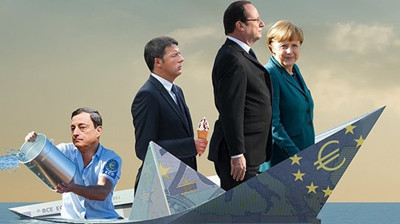The euro zone

It was an illusion. In recent weeks the countries of the euro zone have begun to take in water once again. Their collective GDP stagnated in the second quarter: Italy fell back into outright recession, French GDP was flat and even mighty Germany saw an unexpectedly large fall in output (see article). The third quarter looks pretty unhealthy, partly because the euro zone will suffer an extra drag from Western sanctions on Russia. Meanwhile, inflation has fallen perilously low, to around 0.4%, far below the near-2% target of the European Central Bank, raising fears that the zone as a whole could fall prey to entrenched deflation. German bond yields are hovering below 1%, another harbinger of falling prices. The euro zone stands (or wobbles) in stark contrast with America and Britain, whose economies are enjoying sustained growth.
譯文屬譯生譯世











